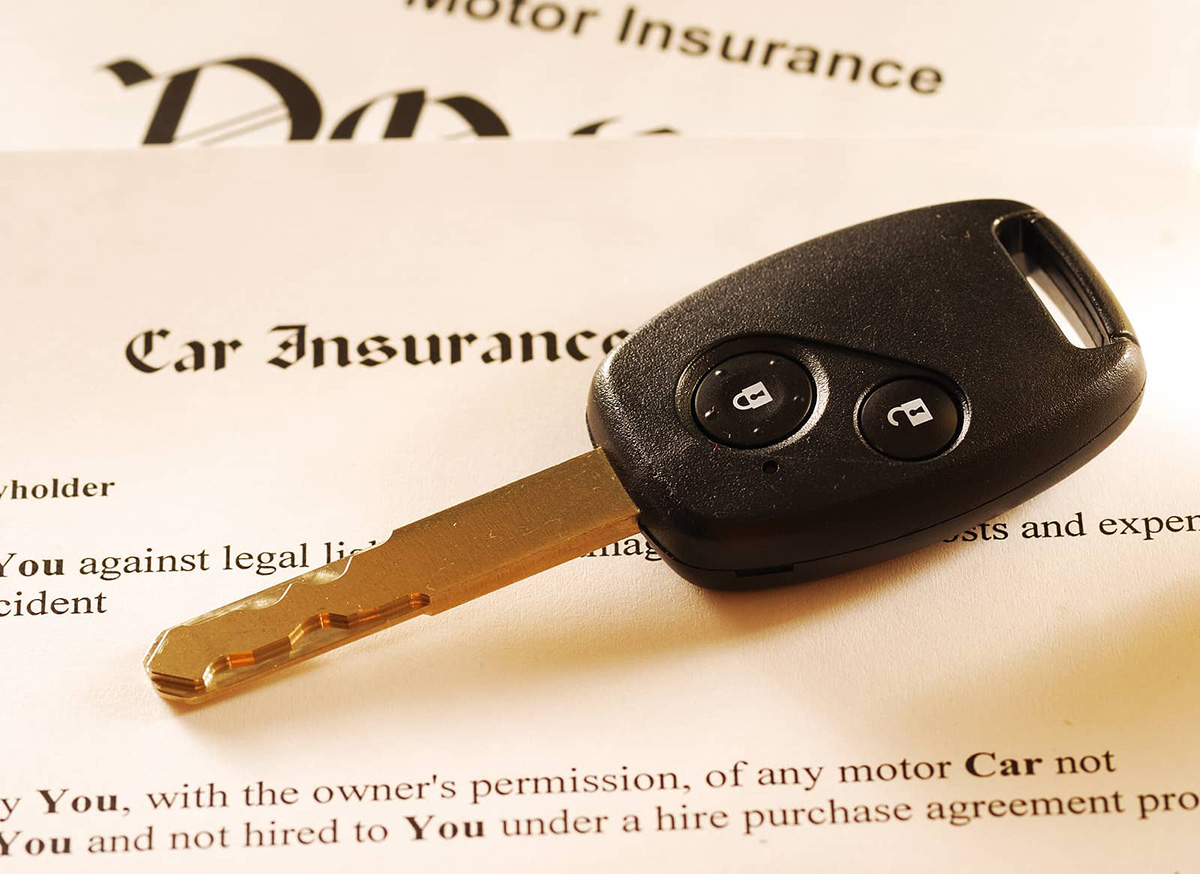

Finance
How Long Do I Have To Have Sr22 Insurance?
Published: November 21, 2023
Discover the answer to "how long do I have to have SR22 insurance?" and gain insight into the finance aspect. Find all the information you need in one place!
(Many of the links in this article redirect to a specific reviewed product. Your purchase of these products through affiliate links helps to generate commission for LiveWell, at no extra cost. Learn more)
Table of Contents
- Introduction
- What is SR22 Insurance?
- The Purpose of SR22 Insurance
- How Long Do I Need to Have SR22 Insurance?
- Factors Affecting the Duration of SR22 Requirements
- State Requirements for SR22 Insurance
- How to Obtain SR22 Insurance
- Cost of SR22 Insurance
- Finding the Right SR22 Insurance Provider
- Maintaining SR22 Insurance Compliance
- Conclusion
Introduction
Obtaining insurance for your vehicle is a requirement in most states, but there are certain situations that may call for additional coverage. One such situation is when you are required to have SR22 insurance. If you find yourself in this position, you may be wondering how long you will need to maintain this type of coverage.
SR22 insurance is not actually a type of insurance policy, but rather a certificate that provides proof of financial responsibility. It is typically required for individuals who have been convicted of certain driving offenses, such as driving under the influence (DUI) or reckless driving. The purpose of SR22 insurance is to show the state that you are financially capable of covering any future accidents or incidents.
The duration of time that you will need to have SR22 insurance can vary depending on your specific circumstances and the requirements of your state. In general, you can expect to have to maintain this coverage for a minimum of three years. However, it’s important to note that this time frame can be subject to change based on various factors.
In the following sections, we will explore the factors that can affect the duration of SR22 insurance requirements, the state-specific mandates regarding SR22 insurance, the process of obtaining SR22 insurance, the associated costs, and tips for finding the right SR22 insurance provider. Additionally, we will discuss the importance of maintaining compliance with SR22 insurance requirements.
Understanding the ins and outs of SR22 insurance will help you navigate these requirements confidently and ensure that you are meeting all legal obligations to continue driving. So, let’s dive in and get a clearer understanding of how long you may need to have SR22 insurance.
What is SR22 Insurance?
SR22 insurance, also known as a certificate of financial responsibility, is not a type of insurance policy itself, but rather a document that verifies that you have sufficient auto insurance coverage. It is typically required for individuals who have been convicted of specific driving offenses, such as DUI/DWI, reckless driving, driving without insurance, or multiple traffic violations.
When you are required to have SR22 insurance, you will need to contact an insurance company that offers this type of coverage. They will then file the SR22 form with your state’s Department of Motor Vehicles (DMV) on your behalf. This form serves as proof that you have the necessary insurance coverage to meet the state’s requirements.
It’s essential to understand that SR22 insurance is not an alternative to regular auto insurance. Rather, it is an additional rider or endorsement that is attached to your existing auto insurance policy. This means that you must already have a valid auto insurance policy in place before you can obtain SR22 coverage.
For the duration of time that you are required to have SR22 insurance, it is crucial that you maintain continuous coverage and avoid any lapses or cancellations in your policy. If your policy is canceled or lapses for any reason, your insurance provider is required to notify the DMV, which can result in the suspension of your driving privileges.
While SR22 insurance is often associated with high-risk drivers, it is important to note that not everyone who requires SR22 insurance is a high-risk driver. The need for SR22 insurance can be a result of a one-time offense or a specific circumstance, and it is designed to ensure that you fulfill your financial responsibility as a driver.
Now that we have a better understanding of what SR22 insurance entails, let’s explore how long you may be required to maintain this coverage.
The Purpose of SR22 Insurance
The primary purpose of SR22 insurance is to demonstrate financial responsibility to the state authorities. When you are required to have SR22 insurance, it means that you have been involved in driving offenses that deem you a higher risk on the road. The purpose of the SR22 certificate is to ensure that you can cover any potential damages or liabilities resulting from future accidents or incidents.
By requiring individuals to carry SR22 insurance, state authorities aim to protect both the individual and other drivers on the road. The SR22 filing serves as evidence that you have taken necessary steps to adhere to the legal and financial responsibilities associated with being a licensed driver.
One of the main reasons behind the implementation of SR22 insurance requirements is to prevent repeat offenses. By mandating SR22 insurance, states can closely monitor drivers with a history of serious traffic violations or other infractions. This monitoring helps ensure that individuals remain compliant with insurance requirements and promotes safer driving practices.
While SR22 insurance may seem like an inconvenience, it serves as an opportunity for individuals to demonstrate their commitment to responsible driving. By maintaining SR22 insurance, you can show the state and insurance companies that you have taken steps to improve your behavior behind the wheel and reduce the risk of future incidents.
Besides fulfilling legal obligations, SR22 insurance can also have personal benefits. Having this type of coverage can provide you with financial protection in the event of an accident. It offers peace of mind by ensuring that you have adequate insurance coverage to handle any potential damages or liabilities.
Overall, the purpose of SR22 insurance is to hold individuals accountable for their actions on the road while promoting safer driving habits. By understanding the importance of this requirement and fulfilling it diligently, you can regain your driving privileges and work towards maintaining a clean driving record.
How Long Do I Need to Have SR22 Insurance?
The duration of time that you will need to have SR22 insurance can vary depending on several factors. In general, you can expect to have to maintain this coverage for a minimum of three years. However, it’s important to note that this time frame can be subject to change based on the specific circumstances surrounding your offense and the requirements of your state.
The length of time you need SR22 insurance typically starts from the date of your conviction or from the date your license was reinstated after a suspension or revocation. Your state’s DMV or relevant authority will provide you with the accurate details regarding the duration of SR22 filing.
Some states may require you to maintain SR22 insurance for a longer duration, such as five years or even ten years. Other factors that can impact the duration include the severity of the offense, the number of offenses on your driving record, and whether you have any prior DUI or DWI convictions.
It’s crucial to adhere to the mandated SR22 filing period to avoid any legal consequences or further suspension of your driving privileges. Typically, if you fail to maintain SR22 insurance for the entire required duration, your insurance provider is obligated to notify the DMV, which can result in license suspension or other penalties.
It’s important to note that even if you no longer own vehicles, or if you move to a different state, you may still be required to maintain SR22 insurance as long as the mandated duration has not been fulfilled. It’s essential to understand and comply with the specific requirements of your state to ensure you fulfill your obligations.
Keep in mind that once the mandated period for SR22 filing has ended, you will need to contact your insurance provider to have the SR22 removed from your policy. This typically involves requesting a letter of compliance or SR26 form to submit to the DMV, indicating that you have met the requirements.
It’s advisable to contact your state’s DMV or consult with an insurance professional to get a clear understanding of the duration requirements specific to your situation. Understanding how long you need to maintain SR22 insurance will help you better plan and navigate the process of fulfilling your legal obligations.
Factors Affecting the Duration of SR22 Requirements
The duration of SR22 insurance requirements can be influenced by various factors. While the minimum required duration is often three years, certain circumstances can extend or shorten this timeframe. It’s important to consider these factors to understand why your SR22 filing period may differ from others.
1. Offense Severity: The seriousness of the offense you were convicted of plays a significant role in determining how long you need to maintain SR22 insurance. More severe infractions, such as multiple DUI or DWI convictions, may result in longer SR22 filing periods. High-risk driving behavior or violations that caused significant harm or led to accidents can also extend the duration.
2. Previous Convictions: If you have prior offenses on your driving record, especially related to DUI/DWI or other similar violations, it may affect the duration of your SR22 filing. Previous convictions demonstrate a pattern of risky behavior, which can lead to more extended periods of mandatory SR22 insurance.
3. State Requirements: Each state has its own regulations and requirements regarding SR22 insurance. Some states have minimum required filing periods, while others may have longer durations for specific offenses. It’s essential to familiarize yourself with your state’s laws to understand how they impact the duration of your SR22 insurance.
4. Compliance with SR22 Requirements: Any lapses or failures to comply with SR22 insurance requirements can result in an extension of the mandated filing period. If you allow your policy to lapse, do not renew your SR22 coverage, or fail to make timely premium payments, your insurance provider is obligated to notify the DMV, potentially leading to an extension of your SR22 requirement.
5. Driving Record Improvement: Demonstrating consistent safe driving practices and maintaining a clean record during your SR22 filing period can have a positive impact. If you adhere to all traffic laws, avoid further violations, and take steps to improve your driving behavior, you may be eligible for a shorter SR22 filing period.
6. Individual State Discretion: While specific guidelines exist, states may have the authority to exercise discretion in certain cases. This means that, depending on the circumstances and your state’s policies, the DMV or court may have the ability to shorten or lengthen the duration of SR22 filing beyond the typical minimum requirements.
It’s crucial to remember that the duration of your SR22 requirement will be determined by these factors and the laws of your state. Consulting with your insurance provider or legal counsel can provide you with more clarity on how these factors apply to your specific situation.
State Requirements for SR22 Insurance
When it comes to SR22 insurance, the specific requirements can vary from state to state. Each state sets its own guidelines and regulations regarding SR22 filings and the duration of coverage. It’s important to understand the requirements of your particular state to ensure compliance and avoid any legal repercussions.
While it’s not feasible to outline the requirements of every state here, we can provide you with a general overview of what to expect when it comes to SR22 insurance in the United States:
1. Minimum Coverage: All states require drivers to carry at least the minimum auto insurance coverage mandated by law. This is typically liability insurance, which covers damages to others in the event of an accident. Your SR22 insurance must meet or exceed these minimum coverage requirements.
2. SR22 Filing Fee: Most states require a filing fee to process and submit the SR22 form. The amount of this fee varies from state to state, so it’s essential to inquire about the specific cost in your jurisdiction.
3. SR22 Period: The duration for which you need to carry SR22 insurance varies by state and is often determined by the severity of the offense committed. As mentioned earlier, the minimum required duration is typically three years. However, some states may have shorter or longer periods depending on the offense and other factors.
4. SR22 Renewal: It’s important to understand that SR22 insurance is not a one-time requirement. It requires the continuous maintenance of coverage throughout the mandated period. This means you must renew your SR22 policy and ensure that there are no lapses or cancellations in coverage.
5. Change of Address: If you move to a different state during your SR22 filing period, it is your responsibility to comply with the requirements of your new state. You may need to transfer your SR22 insurance to the new state and fulfill any additional obligations or documentation requested.
It’s crucial to consult with your state’s Department of Motor Vehicles (DMV), an experienced insurance agent, or legal counsel to understand the specific SR22 requirements in your state. They can provide you with accurate information and guide you through the process of obtaining and maintaining SR22 insurance to comply with your state’s regulations.
Understanding the state requirements for SR22 insurance will help you ensure compliance with the law and maintain your driving privileges throughout the mandated filing period.
How to Obtain SR22 Insurance
If you are required to have SR22 insurance, it’s essential to understand the steps involved in obtaining this type of coverage. The process may vary slightly depending on your state and insurance provider, but these general guidelines can help you navigate through it:
1. Contact your Insurance Provider: The first step is to reach out to your current auto insurance provider to inquire about their ability to offer SR22 coverage. Not all insurance companies offer SR22 filings, so it’s important to confirm if they can fulfill this requirement. If they do not provide SR22 insurance, ask them for a referral to an insurance company that specializes in high-risk coverage.
2. Provide Necessary Information: Once you have identified an insurance provider who offers SR22 filings, you will need to provide them with the necessary information to initiate the process. This typically includes personal information such as your name, address, date of birth, driver’s license number, and details of the offense that led to the requirement of SR22 insurance.
3. Choose the Insurance Policy: Work with the insurance provider to select an auto insurance policy that meets the state’s minimum coverage requirements. The SR22 filing will be added as an endorsement or rider to this policy. It’s crucial to ensure that the policy provides the required liability coverage and any additional coverage you may choose.
4. Pay the Premium: Like any insurance policy, SR22 insurance requires payment of a premium. The cost of SR22 insurance can vary based on several factors, including your driving history, the severity of the offense, and the state where you reside. Make sure to inquire about the payment options and any discounts you might be eligible for to acquire the best possible rate.
5. SR22 Filing: After purchasing the auto insurance policy and making the necessary payments, the insurance provider will file the SR22 form on your behalf with the appropriate state authority, typically the Department of Motor Vehicles (DMV). Once the filing is complete, you will receive a copy of the SR22 certificate as proof of coverage.
6. Maintain Continuous Coverage: It is imperative to maintain continuous SR22 insurance coverage throughout the mandated duration. Ensure that you make timely premium payments and renew your policy before it expires. Any lapses or cancellations in coverage can lead to the suspension of your driving privileges, and it may extend the duration of your SR22 insurance requirement.
While these steps provide a general overview of the process, it’s crucial to consult with your insurance provider or legal counsel to ensure compliance with the specific requirements of your state. They can guide you through the necessary steps and answer any additional questions you may have about obtaining SR22 insurance.
Cost of SR22 Insurance
The cost of SR22 insurance can vary based on several factors, including your driving record, the severity of the offense that led to the requirement, your age, the state in which you reside, and the insurance company you choose. It’s important to understand the cost implications of SR22 insurance to effectively budget and plan for this requirement.
1. Higher Premiums: Most insurance companies will increase the premiums for individuals who need SR22 insurance. This is because SR22 filings are often associated with a higher level of risk. Insurance providers consider factors such as past driving offenses, at-fault accidents, and other violations when determining premiums, which can result in higher rates for SR22 coverage.
2. Policy Coverage: The level of coverage you choose for your SR22 insurance can impact the cost. If you opt for a policy with minimum required coverage, the premiums may be lower compared to a policy with higher liability limits or additional coverage options such as comprehensive and collision coverage. It’s important to strike a balance between fulfilling the state’s requirements and securing adequate coverage that protects you financially.
3. Driving Record: The severity and frequency of your driving offenses will also influence the cost of SR22 insurance. If you have multiple violations or a history of serious offenses, insurance companies may consider you a higher risk and charge higher premiums as a result.
4. State Variation: The cost of SR22 insurance can vary from state to state. Some states have lower insurance rates overall, while others have higher rates. Additionally, the filing fees associated with SR22 documentation can vary among states. It’s crucial to understand the specific cost structure of your state and consult with insurance providers to get accurate quotes.
5. Comparison Shopping: It’s advisable to obtain quotes from multiple insurance providers specializing in SR22 coverage. Comparison shopping will allow you to evaluate different rates and select the most cost-effective option for your specific situation. Keep in mind that pricing is not the sole factor to consider. Consider the reputation of the insurance company, their customer service, and the level of coverage provided.
It’s worth noting that SR22 insurance is typically required for a specific duration, such as three years. Therefore, you should consider the cumulative cost of premiums over that period. Maintaining a clean driving record and practicing safe driving habits during this time can also help reduce your insurance premiums in the future.
Ultimately, the cost of SR22 insurance is an additional expense to consider when fulfilling legal requirements. By understanding the factors that influence cost and taking the time to compare options, you can find an affordable SR22 insurance policy that meets your needs.
Finding the Right SR22 Insurance Provider
When it comes to obtaining SR22 insurance, finding the right insurance provider is crucial. Here are some key considerations to help you in your search:
1. Specialization in SR22 Insurance: Look for insurance companies that specialize in offering SR22 insurance. These providers have experience working with high-risk drivers and fully understand the SR22 filing process. Their expertise can ensure a smoother and more efficient experience in obtaining the required coverage.
2. Financial Stability and Reputation: Research the financial stability and reputation of the insurance provider. Check their financial ratings and reviews from other clients to ensure they are reliable and have a good track record of customer service. A financially stable company will be better equipped to provide the necessary coverage and handle any claims efficiently.
3. Competitive Rates: Obtain quotes from multiple insurance providers to compare rates. While price should not be the only determining factor, it’s important to find an SR22 insurance policy that is competitively priced and fits within your budget. Consider the coverage options and premiums offered by each provider to ensure you are getting the best value for your money.
4. State Licensing: Verify that the insurance provider is licensed to operate in your state. This ensures that they are familiar with the specific SR22 insurance requirements and can facilitate the filing process seamlessly.
5. Customer Service: Good customer service is essential, especially when dealing with the complexities of SR22 insurance. Look for an insurance provider that is responsive, attentive, and has a dedicated customer service team. They should be able to address your questions, guide you through the process, and provide ongoing support throughout the duration of your SR22 requirement.
6. Coverage Options: Evaluate the coverage options offered by the insurance provider. While meeting the minimum state requirements is necessary, consider additional coverage options that may suit your needs and provide more comprehensive protection. Discuss with the insurance agent about available add-ons such as collision, comprehensive, or uninsured motorist coverage.
7. Ease of SR22 Filing: Inquire about the process and timeline for filing the SR22 form. A reputable insurance provider will have a streamlined process in place and can handle the filing on your behalf. This saves you time and ensures that the necessary documentation is submitted correctly and in a timely manner.
Remember, obtaining SR22 insurance can be a requirement, but it’s essential to carefully select an insurance provider that meets your specific needs. Take the time to research and compare options to find an insurance company with a good reputation, competitive rates, and a track record of providing excellent customer service.
Maintaining SR22 Insurance Compliance
Once you obtain SR22 insurance, it’s crucial to maintain compliance throughout the required filing period. Here are some key steps to ensure that you fulfill your legal obligations and maintain SR22 insurance compliance:
1. Pay Premiums on Time: Make sure to pay your insurance premiums on time. Late or missed payments can result in a lapse in coverage, which can lead to serious consequences, including the suspension of your driving privileges. Set up reminders or automatic payments to avoid any accidental lapses.
2. Maintain Continuous Coverage: It’s essential to maintain continuous auto insurance coverage throughout the duration of your SR22 requirement. Do not cancel or let your policy lapse without securing a new SR22 policy or having the SR22 removed from your existing policy. Even if you no longer own a vehicle, you may still need to maintain non-owners SR22 insurance to remain compliant.
3. Keep SR22 Documentation Updated: If there are any changes to your policy, such as updating your coverage or switching insurance providers, make sure to notify the state authority requiring the SR22 filing. They need to have accurate and up-to-date information on file. Additionally, if you change your address, inform both your insurance provider and the relevant state authority.
4. Follow Driving Laws: It goes without saying, but it is crucial to obey all traffic laws and practice safe driving habits. Avoid any additional violations or traffic offenses during the period of SR22 requirement. A clean and responsible driving record will not only keep you out of legal trouble but may also help reduce insurance premiums in the future.
5. Respond to DMV Requests Promptly: If the DMV or state authority sends you any notifications or requests regarding your SR22 insurance, respond to them promptly. This may include submitting documentation, providing updated information, or attending mandatory hearings or counseling sessions. Ignoring or delaying responses can lead to penalties or license suspension.
6. Understand State Requirements: Familiarize yourself with the specific SR22 insurance requirements and regulations of your state. States may have different filing periods, coverage limits, and renewal processes. Understanding the rules and regulations will help you avoid any misunderstandings and ensure full compliance with the law.
7. Periodic Policy Reviews: Conduct periodic reviews of your SR22 insurance policy to ensure that it still meets your needs and remains the most suitable option for you. As time passes, your driving record and circumstances may change, which could impact your insurance needs. Regularly reviewing your policy will help you stay informed and make any necessary adjustments.
By following these steps, you can maintain compliance with SR22 insurance requirements and fulfill your legal responsibilities. Staying informed, responsible, and proactive throughout the SR22 filing period will help you successfully navigate this process and pave the way for a clean driving record in the future.
Conclusion
Obtaining SR22 insurance may be a mandatory requirement for individuals who have been convicted of certain driving offenses. While the specific details and duration of SR22 insurance can vary from state to state, understanding the implications and navigating the process is essential.
SR22 insurance serves as proof of financial responsibility and is designed to ensure that individuals can cover potential damages or liabilities resulting from future accidents or incidents. The requirement for SR22 insurance aims to promote responsible driving behavior and protect both the driver and other road users.
When obtaining SR22 insurance, it’s important to find an insurance provider that specializes in SR22 filings, has a solid reputation, and offers competitive rates. Maintaining continuous coverage, paying premiums on time, following traffic laws, and promptly responding to any DMV requests help ensure compliance with SR22 insurance requirements.
Remember, the duration of SR22 insurance is typically a minimum of three years, but it can be longer depending on the offense and state requirements. It’s crucial to fulfill the mandated filing period and remain proactive throughout to avoid any penalties or further suspension of your driving privileges.
By understanding the factors affecting the duration of SR22 requirements, state-specific regulations, how to obtain SR22 insurance, the cost implications, and the importance of compliance, you can successfully navigate this process and fulfill your legal obligations.
If you have any questions or concerns about SR22 insurance, it’s advisable to consult with your insurance provider, legal counsel, or the relevant state authorities. They can provide you with accurate information and guidance tailored to your specific situation.
Remember, SR22 insurance is not a permanent requirement, and by maintaining compliance, you are taking steps towards improving your driving record and regaining your freedom on the road.














